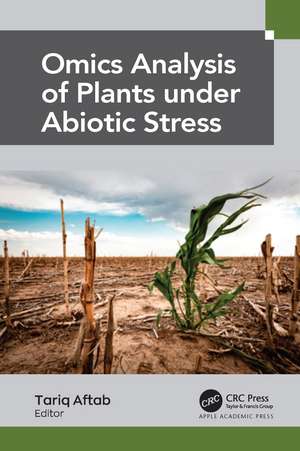Omics Analysis of Plants under Abiotic Stress
Editat de Tariq Aftaben Limba Engleză Hardback – 30 noi 2022
The chapter authors explore a variety of approaches to address plant abiotic stress, including proteomic approaches, genome editing applications, and system biology approaches. The volume takes into consideration, from omics perspective, how to use the plant-microbe interaction to make plants more resilient to changing climates. It also looks at the role of ionomics (the study of complete mineral nutrient and trace elemental composition of a plant species) and osmoprotectants to address multiple abiotic stress tolerance in plants.
Omics Analysis of Plants under Abiotic Stress provides the fundamental information for all who are working in or have interest in this specific field. Unquestionably, this volume will be beneficial for common use of research students, teachers, and persons who have interest in plant abiotic stress physiology.
Preț: 899.62 lei
Preț vechi: 1097.09 lei
-18% Nou
Puncte Express: 1349
Preț estimativ în valută:
172.14€ • 180.21$ • 142.44£
172.14€ • 180.21$ • 142.44£
Carte tipărită la comandă
Livrare economică 05-19 aprilie
Preluare comenzi: 021 569.72.76
Specificații
ISBN-13: 9781774910146
ISBN-10: 1774910144
Pagini: 292
Ilustrații: 10 Tables, black and white; 5 Line drawings, color; 15 Line drawings, black and white; 1 Halftones, color; 1 Halftones, black and white; 6 Illustrations, color; 16 Illustrations, black and white
Dimensiuni: 152 x 229 x 19 mm
Greutate: 0.7 kg
Ediția:1
Editura: Apple Academic Press Inc.
Colecția Apple Academic Press
ISBN-10: 1774910144
Pagini: 292
Ilustrații: 10 Tables, black and white; 5 Line drawings, color; 15 Line drawings, black and white; 1 Halftones, color; 1 Halftones, black and white; 6 Illustrations, color; 16 Illustrations, black and white
Dimensiuni: 152 x 229 x 19 mm
Greutate: 0.7 kg
Ediția:1
Editura: Apple Academic Press Inc.
Colecția Apple Academic Press
Cuprins
1. An Overview of Omics Approaches in Response to Abiotic Stresses in Plants 2. Proteomic Approaches in Physiological Studies of Plant Abiotic Stress 3. Genome Editing Applications in Abiotic Stress Tolerance in Plants 4. Omics Perspective on Plant-Microbe Interaction for Improving Crop Species’ Resilience to Changing Climate 5. The Role of Ionomics as Functional Genomics of Elements in Plant Abiotic Stress Tolerance 6. Molecular Mechanism and Adaptation Strategies of Plants Under Nutrient Deficiency/Toxicity Conditions 7. Emerging Roles of Osmoprotectants in Response to Multiple Abiotic Stress Tolerance in Plants 8. System Biology Approaches Used for Climate Change Resilient Crops 9. Proteomics in Perspective of Abiotic Stress Tolerance in Plants
Notă biografică
Tariq Aftab, PhD, is currently an assistant professor in the Department of Botany at Aligarh Muslim University, India, where he earned his PhD. He is the recipient of a prestigious Leibniz-DAAD fellowship from Germany, a Raman Fellowship from the Government of India, and a Young Scientist Award from the State Government of Uttar Pradesh (India) and Government of India. After completing his doctorate, he worked as Research Fellow at the National Bureau of Plant Genetic Resources, New Delhi, and as Postdoctorate Fellow at Jamia Hamdard, New Delhi, India. Dr. Aftab was also a visiting scientist at the Leibniz Institute of Plant Genetics and Crop Plant Research (IPK), Gatersleben, Germany, and in the Department of Plant Biology, Michigan State University, USA. He is a member of various scientific associations in India and abroad. He has edited over 11 books with international publishers, co-authored several book chapters, and published over 60 research papers in peer-reviewed international journals. His research interests include physiological, proteomic, and molecular studies on medicinal and aromatic plants.
Descriere
Highlights emerging techniques and molecular applications and approaches to address plant abiotic stress, including proteomic approaches, genome editing applications, and system biology approaches. It provides an overview of omics approaches in response to stressors factors at the cellular and molecular levels.
